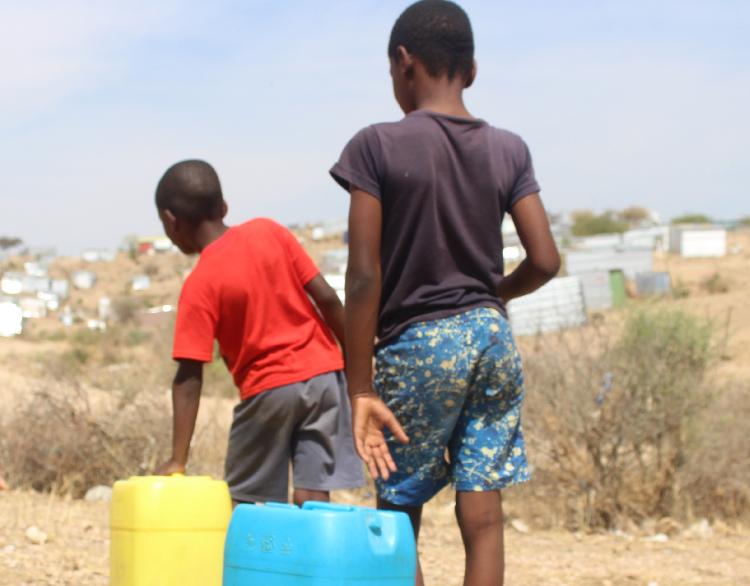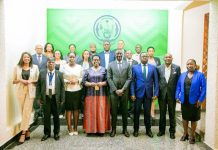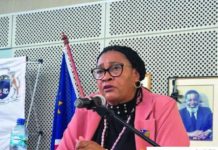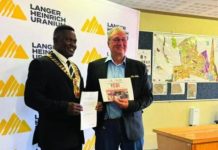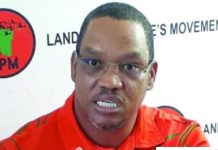Africa-Press – Namibia. WHILE access to water for the average Windhoek resident is just seconds away, for some living in the capital’s informal settlements, the closest tap is two kilometres or even further away.
Victoria Haufiku (30), a Goreangab resident, says her legs cannot take it any more. The single mother of four has been making the journey to get water for the past six years, carrying enough water containers that last only a few days.
The family often does not bath, as the little water they have is reserved for cooking. “We are suffering. We walk for more than two kilometres just to get clean water, and we have been doing this for more than five years,” she says. Haufiku, who is unemployed, says she sometimes goes to sleep on an empty stomach because there is no water for cooking.
“We use a five-litre container which lasts for more than five days just to avoid walking up and down. If the water is finished, the kids will be crying. There’s nothing you can do. Now you feel like you failed as a mother,” she says.
Haufiku says her children are sometimes absent from school for up to three weeks, because the water they have is not enough for them to have a bath. Community leader Shikongo Nicanor says they feel betrayed by the government.
“We still do not have water, no electricity, and no toilets. Are we not in Windhoek? We are tired of empty promises the leaders make during elections, only to disappear afterwards,” he says.
Nicanor says the government should start engaging the people living at informal settlements on the crimes that take place in the areas. “We have cases where women are being raped in their shacks, shacks being broken into, our shacks burning due to candles, because there’s no electricity,” he says.
Bianca Tsaitsias, another Goreangab resident, says the distance they have to travel to get water is too far. “Women are suffering here. I can’t carry 25 litres for a long distance. It’s too heavy for me. It’s always full and overcrowded at the tap, because it’s the only one,” she says.
She says the tap is sometimes out of order, which means they have to go without water and cooked food for days. Another Goreangab community leader, Eliaser Emvula, says living at an informal settlement comes with many challenges.
“When our shacks catch fire or get flooded by the rain, we don’t receive anything. You struggle again with the little you have to rebuild,” he says.
Emvula says they do not have roads either, and it’s not safe to walk through river beds – especially at night. “We as a community tried going to the municipality to ask for assistance, but there was no response. We didn’t get any help,” he says.
Eino Nuulumbu, the branch coordinator of Samora Machel constituency, says the government has given the community two water tanks, which last for two hours only, and are not sufficient for the community.
“The water tanks do not last for days, and they only refill them after two months. How can we survive like this?” he asks. Nuulumbu says the government should provide in every Namibian’s basic needs, and not just some people’s.
Sacky Malima from Goreangab says the townships are normally overcrowded, but this has become worse since the Covid-19 pandemic has caused people to lose their jobs. Many simply cannot afford to pay rent.
“You will find more than 10 people living in one shack. We are not allowed to extend, because it’s the municipality’s place, or they will say you are an illegal occupant,” he says.
Malima says apart from this, women are the main victims of crime in the informal settlements. He says although there are ministries and organisations for the protection of women and children, they have never visited these areas.
“We hear about cases of rape or illegal abortion and abuse, but women are scared. Maybe if we had clinics nearby or social workers, women would feel free to share their experiences,” he says.
Goreangab councillor Nestor Kalola says he is aware that the community has water, electricity and sanitation issues. “As a councillor I wrote a letter to the City of Windhoek to assist us earlier in January 2021, but they have not responded,” he says.
Kalola says he can only share the community’s issues with the authorities. “The municipality and the government should take action on these issues,” he says. Kalola says his community is simply asking for the bare essentials.
For More News And Analysis About Namibia Follow Africa-Press

